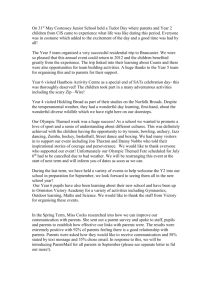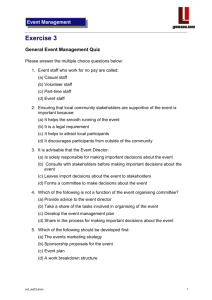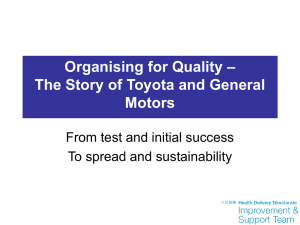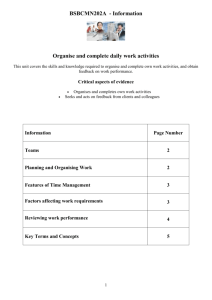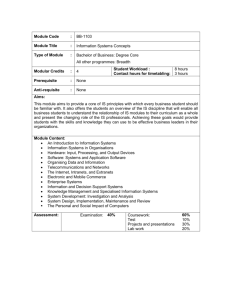Organising for Success
advertisement
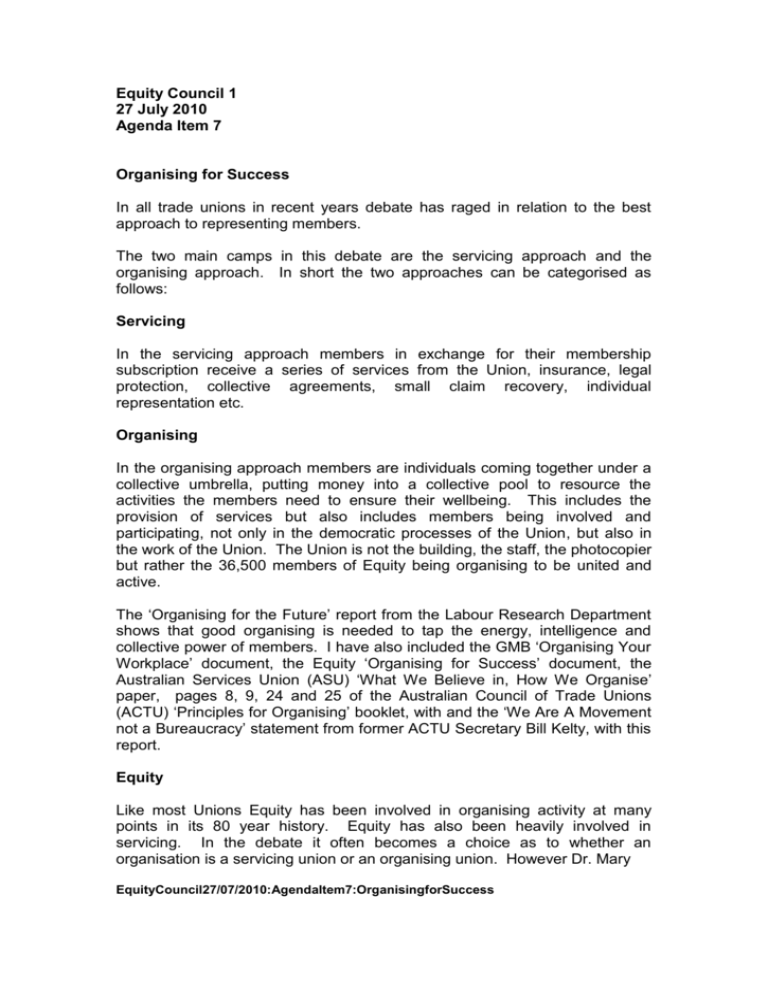
Equity Council 1 27 July 2010 Agenda Item 7 Organising for Success In all trade unions in recent years debate has raged in relation to the best approach to representing members. The two main camps in this debate are the servicing approach and the organising approach. In short the two approaches can be categorised as follows: Servicing In the servicing approach members in exchange for their membership subscription receive a series of services from the Union, insurance, legal protection, collective agreements, small claim recovery, individual representation etc. Organising In the organising approach members are individuals coming together under a collective umbrella, putting money into a collective pool to resource the activities the members need to ensure their wellbeing. This includes the provision of services but also includes members being involved and participating, not only in the democratic processes of the Union, but also in the work of the Union. The Union is not the building, the staff, the photocopier but rather the 36,500 members of Equity being organising to be united and active. The ‘Organising for the Future’ report from the Labour Research Department shows that good organising is needed to tap the energy, intelligence and collective power of members. I have also included the GMB ‘Organising Your Workplace’ document, the Equity ‘Organising for Success’ document, the Australian Services Union (ASU) ‘What We Believe in, How We Organise’ paper, pages 8, 9, 24 and 25 of the Australian Council of Trade Unions (ACTU) ‘Principles for Organising’ booklet, with and the ‘We Are A Movement not a Bureaucracy’ statement from former ACTU Secretary Bill Kelty, with this report. Equity Like most Unions Equity has been involved in organising activity at many points in its 80 year history. Equity has also been heavily involved in servicing. In the debate it often becomes a choice as to whether an organisation is a servicing union or an organising union. However Dr. Mary EquityCouncil27/07/2010:AgendaItem7:OrganisingforSuccess Bousted, General Secretary of the Association of Teachers and Lecturers (ATL), very wisely counselled at the Equity Staff Training Day on 30 June 2010 that it is better to avoid declaring an organisation as one or another. The reality is Unions both organise and service and both approaches are required in any Union tool kit. However there is a question of the balance between the two approaches. If a bird needs two wings to fly, both need to be strong. Organising and servicing activities within Equity need to be developed by the organisational thinking and by the Union being conscious of its thinking in relation to how its organising and servicing wings are developed. In that process the organisation’s mindset becomes important. What mentality does the organisation have? In the past I would contend that Equity was more influenced by a servicing mentality than an organising mentality, and in my experience a servicing mentality strengthens servicing within a Union but does not give enough attention to organising, leaving that wing of the Union’s activity weaker. With one strong wing and one weak wing the danger is that you fly round in circles. On the other hand I content an organising mentality gives attention to both the organising wing of the Union and the servicing wing and works on strengthening both but leading with an organising approach. An organising mentality does not mean Equity becomes an ‘organising Union’ but it does mean that Equity prefers the organising approach which values both organising and servicing, each in its proper place. Equity has in effect been reforming its activity towards an organising approach in a number of ways including Council endorsing the campaigning approach to negotiations and then the change in my position since 1 January 2010 to ‘Assistant General Secretary, Live Performance and Organising’. The Union now needs to formalise this mindset and confirm the Union’s position into the future is based on placing organising and servicing activity within Equity under the umbrella of an organising mentality and the organising approach. Having taken that step the exact detail of what Equity then needs to do on the organising wing I suggest must be developed further in a number of ways. National Organising Team Equity will need to develop an Organising Strategy and I recommend that I convene a staff National Organising Team which in the first instance comprises of the AGS, LP&O, the four Heads of Department and a National/Regional Organiser to undertake the work of developing the strategy, and to begin to co-ordinate the other organising activity the Union is already EquityCouncil27/07/2010:AgendaItem7:OrganisingforSuccess undertaking. Variety Organising Team Council has already endorsed the establishment of a Variety Organising team comprising of the AGS, LP&O, Variety Organiser, a National/Regional Organiser, a Variety Councillor, a Variety Branch Secretary and a Variety Advisory Committee elected member. The first meeting of the Team will be on 28 July 2010 although individuals have been nominated to this meeting as a one off from the lay member side subject to proper election processes following the VAC election later in the year. Workplaces As you can see from the included material many Unions focus on activity in the workplace as the key to the organising approach. Equity currently undertakes frequent workplace visits, recruiting and retaining members, electing Deputies, and dealing the many issues that arise amongst our working members. Deputies, cast, stage management and creative team are as involved as we can get them in the activities of the Union. However this can be improved and deepened in a number of ways that the National Organising Team will examine. Unlike other Unions it is very difficult for Equity to build stable workplace organisation because Equity members are often on short term contracts and companies come and go many times during the course of a year in live performance and are often brought together for a one off activity in recorded media. There are some, but few, workplaces where members are engaged for longer periods of time. Live Performance and Recorded Media will need to develop their own approaches. The organising approach can be equally applied, but in different ways. In Recorded Media for example ensuring residuals, royalties and copyright payments are established and honoured is a very big part of the function of the Department’s work. Linking an organising approach that is compatible with this work will be required. I have attached to this report information from the American AFTRA union and the Canadian union ACTRA that shows how they are approaching organising. Branches and Committees In addition to having the opportunity to being organised in the workplace the other place Equity members come together within the Union structure is within the Branches and Committees. I believe any advancement of the organising approach within Equity must include a greater organising role for Branches and Committees. Steps have already been taken to help the Branches and Committees find a clearer understanding of their role by the introduction of the Equity Council:27/07/10:AgendaItem7:OrganisingforSuccess process by which aims and objectives are formulated and through a more regular coming together of General Branch Secretaries and Chairs. Variety Branch Secretaries already meet several times a year. On 15th and 16th July I addressed Branch Secretaries and Committee Chairs meeting in London to begin the process of discussion of ‘Organising for Success’. Recruitment and Retention Equity has an existing Recruitment and Retention Team which meets monthly. The development of the organising approach will require R&R and organising activity to be co-ordinated. Training Training is central to the organising approach and is seen as a key aspect of trade unionism in the 21st century. It is something that the previous Government supported through partnership with the TUC and a funding stream (Union Learning Fund) only accessible by trade unions. What is unclear is the level of support that will be available under the new coalition Government. The current Equity approach to training is three pronged and managed by Louise Grainger our Marketing, Events and Training Manager: 1) Strategic involvement with the two Sector Sector Skills Councils that cover our sector: Skillset (audiovisual) CCSkills (live performance). The General Secretary currently sits on the boards of both these organisations, both to represent Equity and the Federation of Entertainment Unions. 2) Training for Members as it relates to their profession is delivered by the Training Officer in areas that are useful to their career development. These include programmes of workshops at the Edinburgh Festival and at other events such as the National Student Drama Festival, Move It! The Dance Show, Actors Expo and specific Equity events such as the West End Day for student members. This also includes the ongoing series of workshops created in partnership with other FEU members, funded by the Union Learning Fund and which include day workshops on practical topics such as Copyright for Creatives, Building Your Own Website and others. This project was recognised by Union Learn and received the 2010 Outstanding Achievement Award for Information, Advice and Guidance. Similarly we are working with sister unions in Wales to deliver our CULT Cymru project of continuing professional development workshops and we have done similar work in Manchester and now in Newcastle with regional TUC colleagues. 3) The third area, and the one we will focus on is Training for activists. Equity’s 36,500 members are our best advert to our non-members and the Equity Council:27/07/10:AgendaItem7:OrganisingforSuccess wider industry. The key aspect of this programme of work is to engage members in non-traditional ways and encourage them to become more active within the union. The Union is already active in this area but need to extend this work in the areas already covered, and into new activities which will benefit the Union as a whole. Some of the current work in this area is supported by UnionLearn, some by the Union Modernisation Fund and some solely by Equity. The activity in this area has, so far, concentrated on members who have agreed to act as Deputies, Branch and Committee members, members involved with equality issues and members who have indicated a desire to be more involved in the Union by becoming Ambassadors. We have developed Equity Deputies training in partnership with the TUC Organising Academy. This is for members who are taking on the Deputy role for the first time or who are interested in becoming a Deputy but want to know more about what is involved in order to feel equipped to take on the role. We have developed a day’s training for members new to committee work in response to the increase in members standing for and being elected to the specialist committees at the last round of elections. We then used modules from this, in particular the ones on union structure and motions, as part of the annual Branch Secretaries day last winter. Equity Equality Representatives are again in the main members with whom the union had no previous relationship and who were motivated by a desire to help fellow members. The network is now in place and will become active over the next few months. Both the Ambassador and Equality training is fully recognised and accredited by the Open College Network and participants receive qualification credits on completing the training. Equity Ambassador training was introduced in 2007 for members wanting to be more involved in the union and become actively supportive in workplaces. In the main they are members with whom the union had no contact previously other than to collect their subscriptions. The network now includes members across England and Scotland and the training will be running in Wales and Northern Ireland this year. Ambassadors talk about what the union is doing to their fellow members and non-members, make sure there is Equity information available in a wide range of workplaces and training institutions and many have used it as a stepping stone to becoming more involved in Equity’s democratic structures. For example Ambassadors have gone onto to be on Branch committees and specialist committees, attend the ARC, and now some are standing for Council. They have also brought ideas to the union most notably the highly successful Limelight event and the current Chair of the Young Members’ Committee first got involved with Equity by doing the Ambassador training. EquityCouncil:27/07/10:AgendaItem7:OrganisingforSuccess These are all ongoing programmes but we need to continue to develop them and expand them into new areas where our members are at the vanguard on industrial and political campaigns. We need work with and encourage members to engage them, equip them and encourage them to take on active roles within the union so that they feel confident and proud to get involved with campaigns, to talk about the union and promote Equity, to identify issues in workplaces and find ways of dealing with them. Therefore, training is a major component of the organising agenda. The Training Officer is currently looking at developing new areas of training for activists such as Branch Officials in particular in the area of campaigning and communications. The thinking on this includes a mixture of workshops and a new mentoring system which may fit particularly well within the Branch structure so that vital knowledge, experience and skills can be passed on. The Live performance department is building on the existing deputy training to develop something for more experienced Deputies to help them in taking issues forward, negotiating and so on (copy enclosed). The Training Officer is working with out-of-London Organisers on examining ways of delivering the Stage One Deputy training to members outside of London, and considering ways of keeping these new activists engaged and involved in their networks. This latter aspect will probably be best delivered via social networking technology and forms part of the discussions for the new website. In addition to looking at our training portfolio, we will also be looking at a programme of “training the trainer” so that Equity can deliver training without having to bring in TUC tutors. It would be useful to have an initial pool of Equity staff and then members who are properly able to deliver training to existing and potential activists. This would require a commitment as regards staff time and the costs involved for both staff and members and may require a partnership with a TUC recognised college. There clearly needs to be proper and sustained investment to research, development and deliver an expanded training programme. We believe that our current training programme has been successful and this is very much thanks to the dedicated work of Louise Grainger particularly in getting external funding to support some of this work but these funding streams may well be drying up given the change in Government and the economic environment. If the Union is committed to creating the next generation of activists and delivering the organising model throughout the Union then the investment we must make in training will be vital. Conclusion Involving members more in Equity’s activities, providing training and coordination across the organisation to build the Union’s power in our workplaces and industries to a greater extent than it exists today, is the Equity Council:27/07/10:AgendaItem7:OrganisingforSuccess goal of adopting an organising approach. Equity increasing the Union’s strength by linking it more directly to levels of membership and direct membership activity in support of the Union’s goals is the objective. In line with the Trade Union Congress (TUC) Five Organising Fundamentals members will be encouraged to work collectively and campaign together receiving the support and advice of Deputies and paid officials to assist them to win their issues. A Union rooted in the membership, inclusive and creating opportunities for empowerment, involvement and activism for all members in a growing organisation. That’s where ‘Organising for Success’ is aiming to take us. Stephen Spence ASSISTANT GENERAL SECRETARY Live Performance and Organising Equity July 2010 Equity Council:27/07/10:AgendaItem7:OrganisingforSuccess
